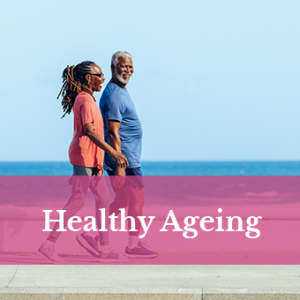
Exploring the Self-Care Practices and Healthcare-Seeking Behaviours among members at Senior Service Centres in the Western Cape, South Africa
Presenter(s):
Fahmida Harris, University Of Cape Town, South Africa
Abstract
Introduction
Self-care practices are intentional actions taken to prioritise well-being. Similarly, healthcare-seeking behaviours encompass any activity undertaken to find a solution to a health problem. The population of older persons (>60 years) in South Africa is predicted to be approximately 15.4% of the total population by 2050, resulting in a higher disease burden related to chronic conditions. The World Health Organization (WHO) identified optimisation of intrinsic capacity and functional ability through early intervention at the community level as key to healthy ageing. Supporting self-management is believed to allow older persons to stay healthy and active for longer periods. This presentation reports on the self-care practices and health-seeking behaviours of members of Senior Service Centres in the Western Cape Province.
Methodology
Forty-one service centres were selected by stratified random sampling, and 35 consented. A convenient sample was recruited from 3,051 registered members at the selected centres, and 625 members consented.
After obtaining ethical approval and permission, a self-developed questionnaire was used to capture participants’ profiles. The WHO Quality of Life-BREF and the WHO Disability Assessment Schedule II were administered. Information on the participants’ self-care practices and healthcare-seeking behaviours was extracted from the data and descriptively analysed.
Results/Findings
The participants, aged 60-100 years (mean=74.1+/-7.51 years), were mostly women (85.1%). Most members (491/625) reported multiple chronic conditions (MCC). Participants were mainly diagnosed by healthcare practitioners (90%), and fifteen were self-diagnosed. Members with MCC (hypertension, diabetes, heart disease) reported problems with their vision (35,8%), hearing (27,9%), and 28% had experienced falls. To manage their health problems, 87% of members took medication prescribed by healthcare practitioners, and 184 took over-the-counter medication. More than 94% of members reported getting sufficient sleep, and most engaged in physical activities like walking (72,3%), exercise classes (64.6%) and dancing (18.3%). Only 30% of members consumed fruit and vegetables daily.
Discussion/Conclusion
Most members had MCC requiring ongoing management to avoid health complications. Members’ healthcare-seeking behaviours and self-care practices enabled them to proactively select activities or actions that promoted their health and well-being. Given the limited access and use of geriatric services, it is recommended that health promotion programmes should focus on enhancing self-care practices through education. Community health workers may be able to meet this need to improve health literacy and self-efficacy through visits to these services centres.
Bio(s):
Name: Fahmida Harris
Address:Cape Town, South Africa
Qualifications:
BSc Physiotherapy (UWC) (1996)
MSc Physiotherapy (UCT) (2018)
Orthopaedic Manipulative Therapy (OMT) (2006)
*Masters degree thesis focused on Geriatrics with a specific interest in Senior Service Centres for Older Persons and its role in facilitating healthy and active ageing
Expertise:
• Area of expertise include geriatrics/care of older persons, mental health, neurology, orthopaedics and respiratory physiotherapy.
Previous Work Experience:
• Manager and Head of Physiotherapy Department at Lentegeur Psychiatric Hospital (Cape Town), including the supervision of eleven physiotherapy assistants (10years) and undergraduate physiotherapy students from UCT
Current Work Experience:
• Employed at the University of Cape Town since 2008 as a Senior Clinical Educator providing lecturing, clinical teaching and supervision to undergraduate physiotherapy students in the Department of Rehabilitation Sciences (UCT) at various clinical placements (Eg: hospitals, old age homes, rehabilitation centres, schools etc)
Primary clinical sites for 2025: FGLowe Old Age Home
Two Military Hospital
Lentegeur Psychiatric Hospital
• Co-ordinator of physiotherapy Rehabilitation & Wellness Cluster managing student services at seven old age homes in Cape Town.
• Serves as a member of the FGLowe Village Board (Old Age Home) overseeing compliance and ethical and legal integrity in daily operations.
